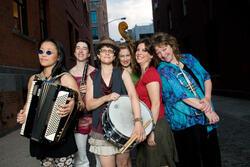The Supreme Court and the Future of Abortion
(Author’s note: I appreciate your patience with this column’s unexpectedly long hiatus. Staff changed, I finished graduate school and got married. I’m excited to be back).
This week, the Supreme Court will hear oral arguments in a case that offers the most significant challenge to Roe v. Wade in decades. If the Court rules in favor of the state of Mississippi, abortion will immediately become illegal there and in eleven other states.
This is personal, not only because I am a person who can get pregnant, not only because I love many people who have had abortions, not only because bodily autonomy is sacred to my sense of self and my relationship to Judaism. I also work for an abortion fund.
At the organization I work for, we believe that there should be no barriers to abortion care for those who want it—least of all financial. In practice, this translates to funding (at least partially) the abortions of thousands of people across North and South Carolina. The cost of the procedure is just part of the puzzle. The people who contact us often need help covering childcare expenses, gas money to get to the clinic, and even hotel stays if their nearest clinic is far from where they live. Sometimes things come down to the wire: If a patient is short on cash, their appointment gets pushed back, which is financially, psychologically, and emotionally draining.
Callers come from all walks of life. Sometimes they want to be reassured that they’re doing “the right thing.” Sometimes they ask if it’s okay to be relieved and sad all at the same time. “You’re doing what you feel is right for you,” we respond. “It doesn’t mean it isn’t hard. But it’s your decision to make.” The work is constant, frequently exhausting, and astoundingly uplifting, all at once.
Bills like Texas’ SB8 (which effectively bans abortions after six weeks) shake people like me who work in reproductive justice. Public interest in preserving abortion access seems to wax and wane depending on what threatening legislation is at the forefront of the news cycle. But chipping away at rights and accessibility happens 365 days a year. It doesn’t matter if you live in a “blue” state—our liberation is bound up in each other, and no one deserves to go without care because of their zip code.
So as the Supreme Court begins to hear oral arguments in Dobbs vs. Jackson Women’s Health, I want to immerse myself in the words and work of those who have never wavered in their commitment to keeping abortion safe and legal. And I want to be precise in naming those who drive most of the threats to abortion in this country.
In the New York Times last week, Lilith editor Sarah Seltzer argued against the weaponization of Christian religiosity in American abortion debates and the outsized weight give to a relatively small percentage of Christian opinions on abortion. No matter how Americans are polled, the majority support legal access to abortion in all or most cases. Polling by religious denomination yields only four groups in which the majority do not support legal abortion in all or most cases: Catholics, Evangelical Protestants, Mormons, and Jehovah’s Witnesses. The political anti-abortion movement that formed in the latter half of the twentieth century, Seltzer notes, primarily came about as a coalition between conservative evangelicals and Catholics.
This is not to say that Jewish people and groups unilaterally support abortion rights. Seltzer notes that as many Orthodox communities have drifted rightward on issues related to Israel and immigration, so have their views on abortion. But Jewish attitudes toward the issue are complex and tilted in favor of bodily autonomy. “We are far from the only religion to take a nuanced stance on abortion,” Seltzer writes. “But a religious group that dictates a sweeping, intractable view of right and wrong when it comes to abortion may have an easier time getting attention than, for instance, the religious organizations that recently filed an amicus brief to the Supreme Court, asking fervently for careful, circumstance-based consideration in the upcoming abortion case out of Mississippi.”
For Jews who are concerned about the specific and present threat to abortion accessibility in this country, it is important to continue to hold the line and reject sweeping generalizations that paint religious groups with a broad brush. It is even more important to get to know and support your local abortion fund now. Funds need consistent financial sustainers, yes—but they also need volunteer drivers, childcare coordinators, doulas, and people unafraid to say the word abortion out loud. Say it joyfully. Say it reverently. Say it plainly.








Unfortunately there is not much dialogue about abortion in the Jewish community or any community. Rather both sides sit isolated in their own room taking to like minded folks. There are elephants in each room, though. In one room, the elephant is in the form of serious pressures, physical, emotional, and financial, which weigh on a pregnant woman. In the other room, the elephant appears as a fetus in the womb, alive since conception, definitely human, genetically unique, and developing daily. That these two sides have little empathy for each other is a real tragedy.